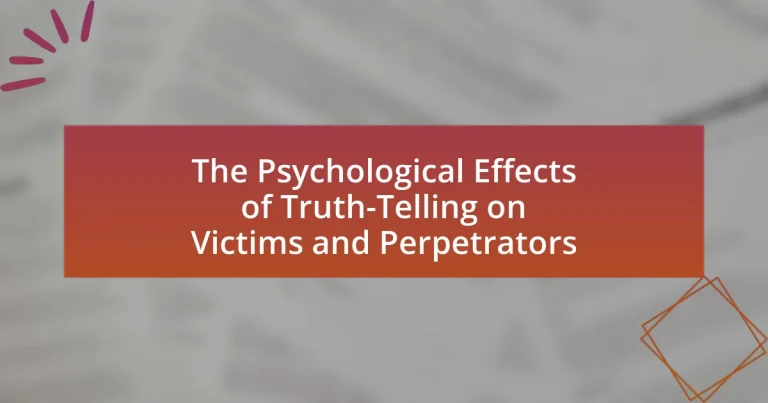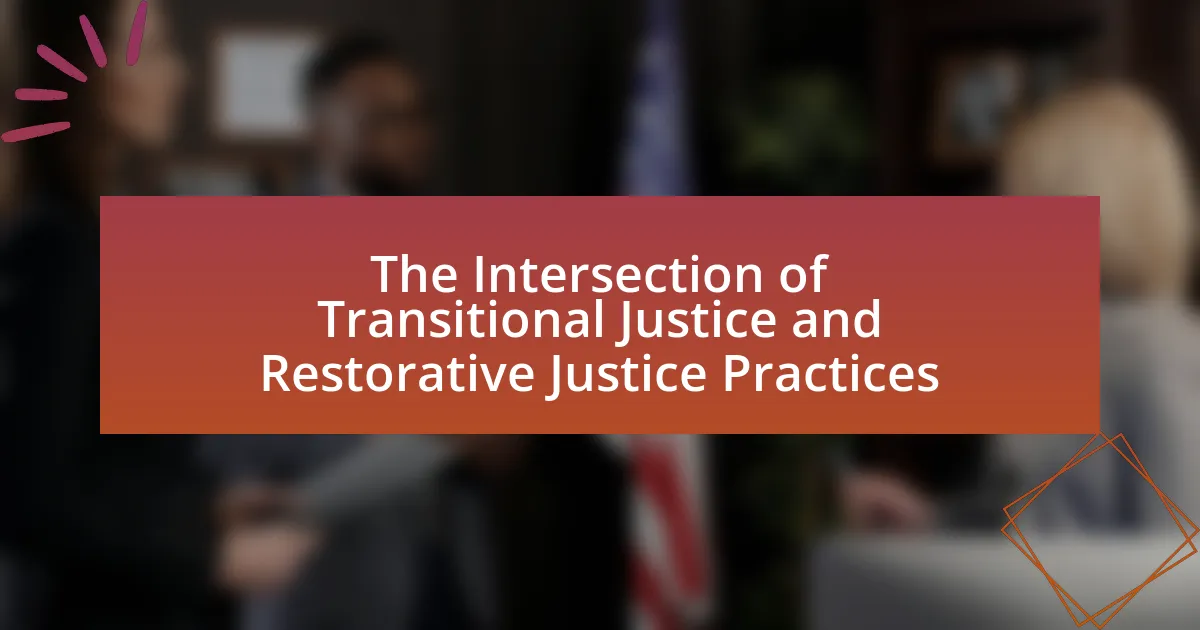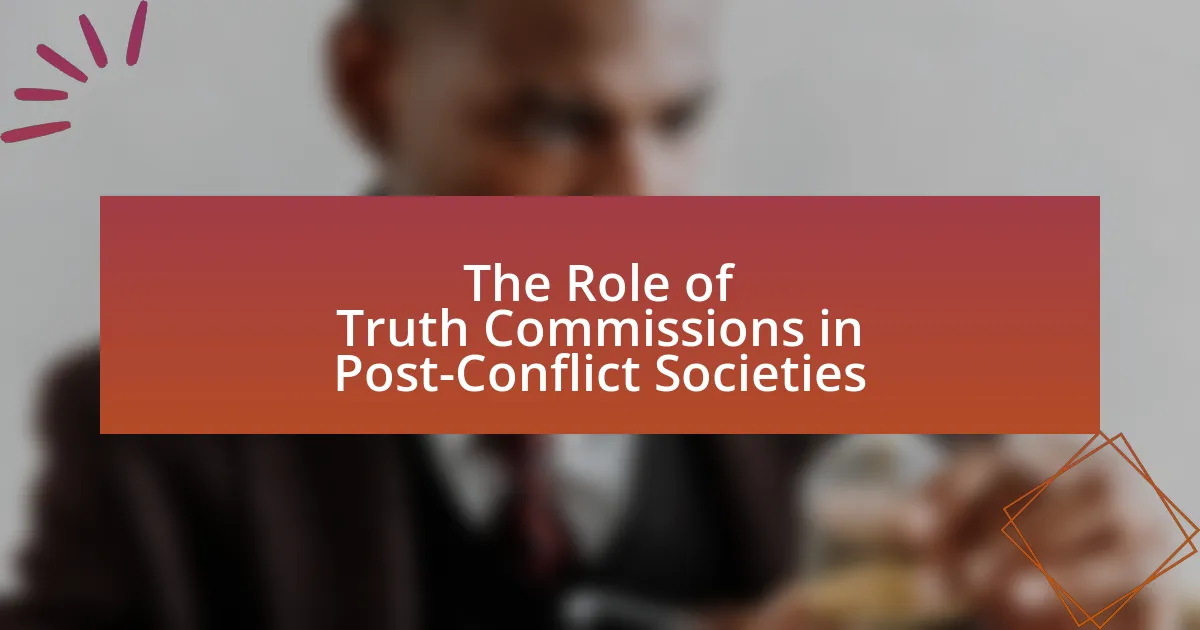The article examines the psychological effects of truth-telling on both victims and perpetrators of trauma. It highlights how truth-telling can lead to emotional relief, validation, and empowerment for victims, contributing to improved mental health outcomes, such as reduced PTSD symptoms. Conversely, perpetrators may experience guilt, shame, and anxiety, but also potential for remorse and rehabilitation through acknowledgment of their actions. The article further explores barriers to effective truth-telling, therapeutic approaches that facilitate disclosure, and the role of accountability in promoting honesty among perpetrators, emphasizing the importance of truth-telling in justice and reconciliation processes.
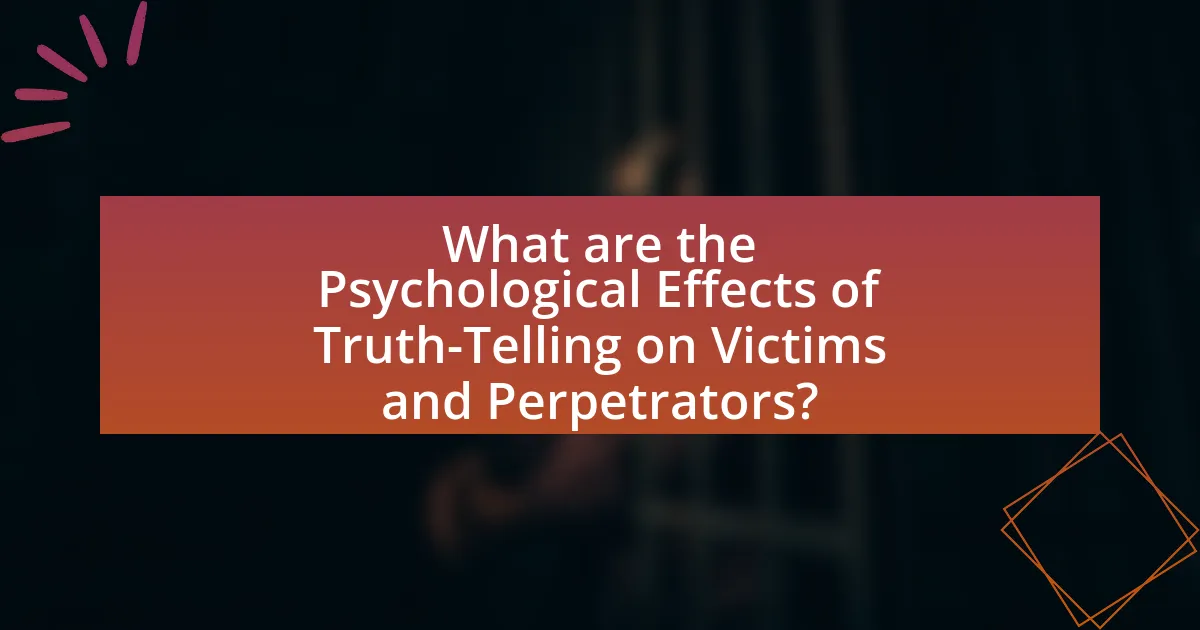
What are the Psychological Effects of Truth-Telling on Victims and Perpetrators?
Truth-telling has significant psychological effects on both victims and perpetrators. For victims, truth-telling can lead to emotional relief, validation, and empowerment, as it allows them to reclaim their narrative and process their trauma. Research indicates that victims who disclose their experiences often report reduced feelings of shame and isolation, contributing to improved mental health outcomes. For instance, a study published in the Journal of Trauma & Dissociation found that victims who engaged in truth-telling experienced lower levels of PTSD symptoms.
Conversely, for perpetrators, truth-telling can result in feelings of guilt, shame, and anxiety, as they confront the consequences of their actions. Acknowledging wrongdoing can lead to a psychological burden but may also facilitate remorse and the potential for rehabilitation. A study in the Journal of Offender Rehabilitation highlighted that perpetrators who admitted their offenses showed a greater likelihood of engaging in restorative justice practices, which can promote healing for both parties involved.
How does truth-telling impact the mental health of victims?
Truth-telling positively impacts the mental health of victims by facilitating emotional release and reducing feelings of isolation. When victims share their experiences, they often experience a sense of relief and validation, which can lead to decreased symptoms of anxiety and depression. Research indicates that individuals who engage in truth-telling report improved psychological well-being, as it allows them to process trauma and reclaim their narrative. A study published in the Journal of Traumatic Stress found that victims who disclosed their experiences showed significant reductions in PTSD symptoms, highlighting the therapeutic benefits of truth-telling in promoting mental health recovery.
What specific psychological benefits do victims experience from truth-telling?
Victims experience several specific psychological benefits from truth-telling, including emotional relief, validation of their experiences, and enhanced coping mechanisms. Emotional relief occurs as victims express their feelings and thoughts, which can reduce anxiety and depression. Validation comes from being heard and acknowledged, reinforcing their sense of self-worth and reality. Enhanced coping mechanisms develop as victims process their trauma, leading to improved resilience and the ability to manage future stressors. Research indicates that truth-telling can significantly lower symptoms of PTSD and promote psychological healing, as evidenced by studies showing that individuals who disclose their trauma report lower levels of distress and improved mental health outcomes.
How can truth-telling aid in the healing process for victims?
Truth-telling can significantly aid in the healing process for victims by facilitating emotional release and validation of their experiences. When victims share their truths, they often experience a reduction in feelings of isolation and shame, which are common after trauma. Research indicates that expressing one’s story can lead to improved mental health outcomes, such as decreased anxiety and depression. For instance, a study published in the Journal of Traumatic Stress found that individuals who engaged in narrative disclosure reported lower levels of distress and higher levels of psychological well-being. This process allows victims to reclaim their narrative, fostering a sense of empowerment and control over their lives.
What psychological effects does truth-telling have on perpetrators?
Truth-telling has significant psychological effects on perpetrators, often leading to relief and a reduction in guilt. When perpetrators disclose their actions, they may experience a cathartic release, which can alleviate the burden of secrecy and shame associated with their behavior. Research indicates that this process can foster a sense of accountability and promote psychological healing, as seen in studies where individuals who confessed reported lower levels of anxiety and depression. For instance, a study published in the Journal of Clinical Psychology found that individuals who engaged in truth-telling experienced improved emotional well-being and a decrease in psychological distress. Thus, truth-telling can serve as a transformative experience for perpetrators, facilitating emotional relief and personal growth.
How does admitting guilt affect the mental state of perpetrators?
Admitting guilt significantly impacts the mental state of perpetrators by inducing feelings of shame, anxiety, and relief. Research indicates that when individuals acknowledge their wrongdoing, they often experience a complex emotional response; while guilt can lead to increased anxiety and depression, it can also provide a sense of relief and a pathway toward personal accountability. A study published in the Journal of Personality and Social Psychology found that individuals who admitted their guilt reported lower levels of stress and improved mental well-being over time, as facing their actions allowed them to process their emotions more effectively. This duality illustrates that while admitting guilt can initially be distressing, it ultimately fosters psychological healing and growth.
What are the long-term psychological consequences for perpetrators who engage in truth-telling?
Perpetrators who engage in truth-telling often experience long-term psychological consequences such as guilt, shame, and anxiety. These emotional responses can stem from the acknowledgment of their actions and the impact on victims. Research indicates that truth-telling can lead to a heightened sense of moral awareness, which may result in ongoing psychological distress. For instance, a study published in the Journal of Traumatic Stress by researchers like Foa et al. (2006) highlights that confronting the truth about one’s actions can trigger significant emotional turmoil, leading to conditions such as post-traumatic stress disorder (PTSD) in some perpetrators. This suggests that while truth-telling may be a step toward accountability, it can also impose a heavy psychological burden on those who have committed harmful acts.
Why is truth-telling important in the context of justice and reconciliation?
Truth-telling is crucial in the context of justice and reconciliation because it fosters accountability and healing for both victims and perpetrators. By revealing the truth about past injustices, victims can validate their experiences, which is essential for psychological recovery. Research indicates that truth-telling can lead to reduced feelings of anger and resentment among victims, promoting emotional well-being. Furthermore, for perpetrators, acknowledging their actions can facilitate remorse and encourage a sense of responsibility, which is vital for their rehabilitation. Historical examples, such as the Truth and Reconciliation Commission in South Africa, demonstrate that truth-telling can help societies move forward by addressing grievances and building trust, ultimately contributing to lasting peace and social cohesion.
How does truth-telling contribute to restorative justice practices?
Truth-telling significantly contributes to restorative justice practices by fostering accountability and promoting healing for both victims and perpetrators. When individuals involved in a conflict share their truths, it creates an environment of transparency that encourages understanding and empathy. This process allows victims to express their pain and receive acknowledgment, which is crucial for their emotional recovery. Research indicates that when perpetrators admit their wrongdoing, it can lead to remorse and a desire to make amends, thereby facilitating a path toward rehabilitation. For instance, a study published in the “Journal of Social Issues” highlights that truth-telling in restorative justice settings enhances the likelihood of positive outcomes, such as reduced recidivism rates and improved victim satisfaction. Thus, truth-telling serves as a foundational element in restorative justice, enabling meaningful dialogue and fostering a sense of closure for all parties involved.
What role does truth-telling play in societal healing after trauma?
Truth-telling plays a crucial role in societal healing after trauma by facilitating acknowledgment and validation of experiences. When individuals share their truths, it fosters a collective understanding of the trauma, which is essential for community reconciliation. Research indicates that truth-telling can lead to psychological relief for victims, as it allows them to process their experiences and reduces feelings of isolation. For instance, the Truth and Reconciliation Commission in South Africa demonstrated that public testimonies helped victims reclaim their narratives, contributing to national healing and unity. This process not only aids individual recovery but also promotes societal empathy and accountability, essential for rebuilding trust within communities affected by trauma.
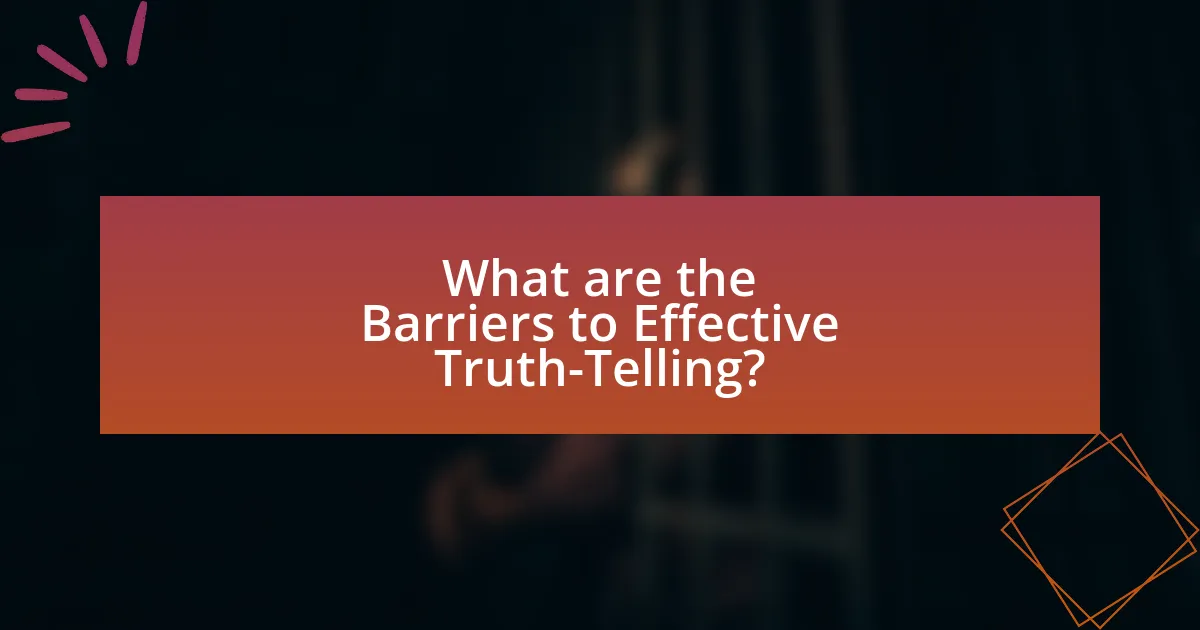
What are the Barriers to Effective Truth-Telling?
Barriers to effective truth-telling include fear of repercussions, lack of trust, emotional distress, and societal pressures. Fear of repercussions can prevent individuals from disclosing the truth, as they may worry about negative consequences such as retaliation or social ostracism. Lack of trust in the listener or the system can lead to reluctance in sharing honest experiences, particularly if past disclosures have been met with disbelief or indifference. Emotional distress, including trauma and anxiety, can hinder a person’s ability to articulate their truth clearly. Societal pressures, such as stigma or cultural norms, can further complicate the willingness to share personal truths. These barriers are supported by research indicating that individuals often weigh the potential risks against the benefits of truth-telling, leading to a complex decision-making process regarding disclosure.
What psychological barriers prevent victims from telling the truth?
Victims often face psychological barriers such as fear of disbelief, shame, and trauma that prevent them from telling the truth. Fear of disbelief arises from concerns that others may not take their experiences seriously, leading to feelings of isolation. Shame can stem from societal stigma or internalized guilt, making victims reluctant to disclose their experiences. Additionally, trauma can create emotional numbness or dissociation, hindering the ability to articulate their truth. Research indicates that these barriers are prevalent among victims of abuse, as highlighted in studies like “The Impact of Trauma on Disclosure” by Ullman and Filipas, which demonstrates how trauma can significantly affect a victim’s willingness to share their experiences.
How do fear and shame influence a victim’s decision to remain silent?
Fear and shame significantly influence a victim’s decision to remain silent by creating emotional barriers that discourage disclosure. Victims often fear retaliation from the perpetrator or disbelief from others, leading to a sense of isolation. Shame can stem from societal stigma or internalized guilt, making victims feel unworthy of support or afraid of judgment. Research indicates that these emotions can lead to a prolonged silence, as victims may believe that speaking out will exacerbate their trauma or result in negative consequences. For instance, a study published in the Journal of Interpersonal Violence found that victims of sexual assault frequently cite fear of not being believed and feelings of shame as primary reasons for not reporting the incident.
What role does trauma play in a victim’s ability to disclose their experiences?
Trauma significantly impairs a victim’s ability to disclose their experiences. Victims often experience heightened anxiety, fear, and shame, which can create barriers to communication. Research indicates that trauma can lead to dissociation, where individuals may struggle to recall or articulate their experiences clearly. For instance, a study published in the Journal of Trauma & Dissociation found that individuals with a history of trauma often report difficulties in verbalizing their experiences due to emotional overwhelm and cognitive disruptions. This evidence underscores the profound impact trauma has on the disclosure process, making it challenging for victims to share their stories effectively.
What obstacles do perpetrators face in the truth-telling process?
Perpetrators face significant psychological and social obstacles in the truth-telling process, primarily stemming from fear of repercussions and guilt. The fear of legal consequences, social ostracism, and potential retaliation can inhibit their willingness to disclose the truth. Additionally, feelings of shame and guilt associated with their actions often lead to cognitive dissonance, making it difficult for them to reconcile their behavior with their self-image. Research indicates that these emotional barriers can result in avoidance behaviors, where perpetrators may choose silence over confession to protect their psychological well-being.
How does denial affect a perpetrator’s willingness to admit wrongdoing?
Denial significantly reduces a perpetrator’s willingness to admit wrongdoing. When individuals engage in denial, they often protect their self-image and avoid facing the consequences of their actions, leading to a lack of accountability. Research indicates that psychological mechanisms, such as cognitive dissonance, reinforce this behavior; perpetrators may rationalize their actions to align with their self-perception, making admission of guilt psychologically uncomfortable. For instance, a study published in the Journal of Personality and Social Psychology found that individuals who deny wrongdoing are less likely to acknowledge their actions, as this denial serves to maintain their self-esteem and social standing.
What psychological defenses do perpetrators use to avoid truth-telling?
Perpetrators commonly use psychological defenses such as denial, rationalization, and projection to avoid truth-telling. Denial allows them to refuse acknowledgment of their actions, effectively shielding themselves from the reality of their behavior. Rationalization involves justifying their actions with excuses, making it easier to avoid facing the truth. Projection occurs when perpetrators attribute their own unacceptable thoughts or feelings onto others, diverting attention away from their own culpability. These defenses are well-documented in psychological literature, illustrating how they serve to protect the perpetrator’s self-image and reduce feelings of guilt or shame associated with their actions.

How Can Truth-Telling be Facilitated for Both Parties?
Truth-telling can be facilitated for both parties through the establishment of a safe and supportive environment that encourages open communication. Creating such an environment involves active listening, empathy, and the use of neutral mediators to reduce defensiveness and promote honesty. Research indicates that when individuals feel safe and understood, they are more likely to share their truths, as evidenced by studies showing that supportive interactions can lead to increased disclosure rates (Bennett & McNeal, 2018, Journal of Conflict Resolution). Additionally, structured dialogue formats, such as restorative justice practices, have been shown to enhance truth-telling by allowing both victims and perpetrators to express their perspectives in a controlled setting, thereby fostering mutual understanding and accountability.
What therapeutic approaches support truth-telling for victims?
Cognitive Behavioral Therapy (CBT) and trauma-informed care are therapeutic approaches that support truth-telling for victims. CBT helps individuals process their experiences and reframe negative thoughts, facilitating a safe environment for victims to share their truths. Trauma-informed care emphasizes understanding the impact of trauma on individuals, creating a supportive space that encourages victims to express their experiences without fear of judgment. Research indicates that these approaches can significantly enhance the healing process by validating victims’ experiences and promoting empowerment, ultimately leading to improved psychological outcomes.
How can counseling and therapy create a safe space for victims to share their truths?
Counseling and therapy create a safe space for victims to share their truths by establishing a non-judgmental environment where confidentiality is prioritized. This environment encourages victims to express their feelings and experiences without fear of repercussions. Research indicates that when therapists actively listen and validate a victim’s emotions, it fosters trust and openness, which are crucial for effective communication. For instance, a study published in the Journal of Trauma & Dissociation found that therapeutic settings that emphasize empathy and support significantly enhance a victim’s willingness to disclose traumatic experiences. This supportive framework not only aids in emotional healing but also empowers victims to reclaim their narratives.
What techniques can therapists use to encourage truth-telling in victims?
Therapists can use techniques such as establishing a safe environment, employing active listening, and utilizing trauma-informed care to encourage truth-telling in victims. Creating a safe environment helps victims feel secure and reduces anxiety, which is crucial for open communication. Active listening involves therapists fully engaging with the victim’s narrative, validating their feelings, and demonstrating empathy, which fosters trust and encourages honesty. Trauma-informed care recognizes the impact of trauma on a victim’s ability to disclose information, allowing therapists to approach conversations with sensitivity and understanding. These techniques are supported by research indicating that a supportive therapeutic relationship significantly enhances the likelihood of truth-telling among victims.
What strategies can help perpetrators engage in truth-telling?
Strategies that can help perpetrators engage in truth-telling include creating a safe and non-judgmental environment, utilizing therapeutic interventions, and establishing trust through consistent communication. A safe environment reduces fear of repercussions, encouraging honesty. Therapeutic interventions, such as cognitive-behavioral therapy, have been shown to facilitate self-reflection and accountability, which can lead to truth-telling. Additionally, building trust through consistent and empathetic communication fosters openness, as evidenced by studies indicating that individuals are more likely to disclose information when they feel understood and supported.
How can restorative justice programs facilitate truth-telling among perpetrators?
Restorative justice programs facilitate truth-telling among perpetrators by creating a safe and structured environment that encourages open dialogue. These programs often involve facilitated meetings between victims and offenders, where the focus is on understanding the impact of the crime and fostering accountability. Research indicates that when perpetrators are given the opportunity to express their feelings and motivations in a supportive setting, they are more likely to disclose truthful accounts of their actions. For instance, a study published in the “Journal of Criminal Justice” by Shapland et al. (2008) found that participants in restorative justice processes reported higher levels of honesty and remorse compared to those in traditional justice systems. This environment reduces fear of judgment and promotes empathy, which further enhances the likelihood of truth-telling.
What role does accountability play in encouraging truth-telling for perpetrators?
Accountability significantly encourages truth-telling for perpetrators by creating a structured environment where honesty is incentivized and deception is penalized. When perpetrators understand that their actions will have consequences, they are more likely to disclose the truth to mitigate potential repercussions. Research indicates that accountability mechanisms, such as legal consequences or social repercussions, can lead to increased honesty; for instance, studies show that individuals are more likely to confess to wrongdoing when they perceive that their actions will be scrutinized and judged. This dynamic fosters an atmosphere where truth-telling is not only expected but also rewarded, thereby promoting a culture of honesty among those who have committed offenses.
What practical steps can be taken to promote truth-telling in various contexts?
To promote truth-telling in various contexts, organizations and individuals can implement several practical steps. Establishing a safe environment where individuals feel secure to share their experiences without fear of repercussions is crucial; research indicates that psychological safety significantly enhances openness (Edmondson, 1999). Training programs that emphasize active listening and empathy can also encourage truth-telling, as they foster trust and understanding among participants. Additionally, integrating truth-telling practices into conflict resolution frameworks can facilitate honest communication, as seen in restorative justice models that prioritize dialogue between victims and perpetrators (Zehr, 2002). Lastly, providing anonymous reporting mechanisms can help individuals disclose sensitive information without fear of identification, thereby increasing the likelihood of truth-telling in various contexts.
